| the
united
nations is already under
international censure, what trust can we put in the
security council now ?? There follow
excerpts from the following article::
Economic Sanctions as a
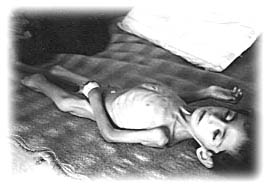 Weapon of Mass Destruction Weapon of Mass Destruction
by Joy Gordon
Harpers Magazine November 2002
If any international act in the last decade is sure to
generate enduring bitterness toward the United States, it
is the epidemic suffering needlessly visited on Iraqis
via U.S. fiat inside the United Nations Security
Council. . Invoking security concerns including those not
corroborated by U.N. weapons inspectors U.S.
policymakers have effectively turned a program of
international governance into a legitimized act of mass
slaughter.
The U.N. adopted economic sanctions in 1945, in its
charter, as a means of maintaining global order, it has
used them fourteen times (twelve times since 1990). But
only those sanctions imposed on Iraq have been
comprehensive, meaning that virtually every aspect of the
country's imports and exports is controlled.
How was the danger of goods entering Iraq assessed, and
how was it weighed, if at all, against the mounting
collateral damage? All U.N. records that could answer my
questions are kept from public scrutiny.
The operation of Iraq sanctions involves numerous
agencies within the United Nations. The Security
Council's 661 Committee is generally responsible
for both enforcing the sanctions and granting
humanitarian exemptions. The Office of Iraq Programme
(OIP), within the U.N. Secretariat, operates the Oil for
Food Programme. Humanitarian agencies such as UNICEF and
the World Health Organization work in Iraq to monitor and
improve the population's welfare, periodically reporting
their findings to the 661 Committee. The United
States has fought aggressively
throughout the last decade to purposefully minimize the
humanitarian goods that enter the country. And it has
done so in the face of enormous human suffering,
including massive increases in child mortality and
widespread epidemics. Iraq was allowed to purchase a
sewage-treatment plant but was blocked from buying the
generator necessary to run it; this in a country that has
been pouring 300,000 tons of raw sewage daily into its
rivers.
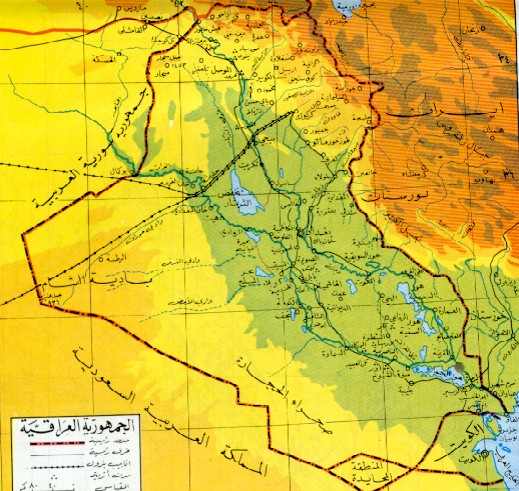
IRAN BEFORE THE GULF WAR
Saddam Hussein's government is well known for its
human-rights abuses against the Kurds and Shi'ites, and
for its invasion of Kuwait. What is less well known is
that this same government had also invested heavily in
health, education, and social programs for two decades
prior to the Persian Gulf War. While the treatment of
ethnic minorities and political enemies has been
abominable under Hussein, it is also the case that the
well-being of the society at large improved dramatically.
The social programs and economic development continued,
and expanded, even during Iraq's grueling and costly war
with Iran from 1980 to 1988, a war that Saddam Hussein
might not have survived without substantial U.S. backing.
Before the Persian Gulf War, Iraq was a rapidly
developing country, with free education, ample
electricity, modernized agriculture, and a robust middle
class. According to the World Health Organization, 93
percent of the population had access to health care.
Ninety-five percent of the population had access to
potable water.
POST GULF WAR : SANCTIONS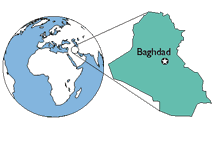
A USA Defense Department evaluation noted that
"Degraded medical conditions in Iraq are primarily
attributable to the breakdown of public services (water
purification and distribution, preventive medicine, water
disposal, health-care services, electricity, and
transportation). . . . Hospital care is degraded by lack
of running water and electricity."
Nearly everything for Iraq's entire infrastructure
electricity, roads, telephones, water treatment as
well as much of the equipment and supplies related to
food and medicine has been subject to Security Council
review. In practice, this has meant that the United
States and Britain subjected hundreds of contracts to
elaborate scrutiny, without the involvement of any other
country on the council; and after that scrutiny, the
United States, only occasionally seconded by Britain,
consistently blocked or delayed hundreds of humanitarian
contracts.
In response to U.S. demands, the U.N. worked with
suppliers to provide the United States with detailed
information about the goods and how they would be
used, and repeatedly expanded its monitoring system,
tracking each item from contracting through delivery and
installation, ensuring that the imports are used for
legitimate civilian purposes. Despite all these measures,
U.S. holds actually increased. In September 2001 nearly
one third of water and sanitation and one quarter of
electricity and educational - supply contracts were on
hold. Between the springs of 2000 and 2002, for example,
holds on humanitarian goods tripled.
Although most contracts for food in the last few years
bypassed the Security Council altogether, political
interference with related contracts still occurred. A
Syrian company asked the committee to approve a contract
to mill flour for Iraq. Whereas Iraq ordinarily purchased
food directly, in this case it was growing wheat but did
not have adequate facilities to produce flour. The
Russian delegate argued that, in light of the report the
committee had received from the UNICEF official, and the
fact that flour was an essential element of the Iraqi
diet, the committee had no choice but to approve the
request on humanitarian grounds. The delegate from
China agreed, as did those from France and Argentina. But
the U.S. representative, Eugene Young, argued that
"there should be no hurry" to move on this
request: the flour requirement under Security Council
Resolution 986 had been met, he said; the number of holds
on contracts for milling equipment was "relatively
low"; and the committee should wait for the results
of a study being conducted by the World Food Programme
first. The British delegate stalled as well, saying that
he would need to see "how the request would fit into
the Iraqi food programme," and that there were still
questions about transport and insurance. In the end,
despite the extreme malnutrition of which the committee
was aware, the U.S. delegate insisted it would be
"premature" to grant the request for flour
production, and the U.K. representative joined him,
blocking the project from going forward.
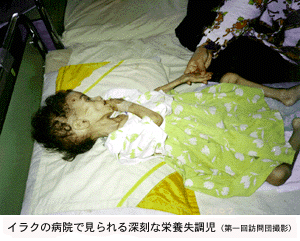 Many members
of the Security Council have been sharply critical of
these practices. In an April 20, 2000, meeting of the
661 Committee, one member after another challenged the
legitimacy of the U.S. decisions to impede the
humanitarian contracts. The problem had reached "a
critical point," said the Russian delegate; the
number of holds was "excessive," said the
Canadian representative; the Tunisian delegate expressed
concern over the scale of the holds. The British and
American delegates justified their position on the
grounds that the items on hold were "dual use"
goods that should be monitored, and that they could not
approve them without getting detailed technical
information. The French delegate suggested, that
providing prompt, detailed technical information was not
sufficient to get holds released: a French contract for
the supply of ventilators for intensive care units
had been on hold for more than five months, despite his
government's prompt and detailed response to a request
for additional technical information and the obvious
humanitarian character of the goods. Many members
of the Security Council have been sharply critical of
these practices. In an April 20, 2000, meeting of the
661 Committee, one member after another challenged the
legitimacy of the U.S. decisions to impede the
humanitarian contracts. The problem had reached "a
critical point," said the Russian delegate; the
number of holds was "excessive," said the
Canadian representative; the Tunisian delegate expressed
concern over the scale of the holds. The British and
American delegates justified their position on the
grounds that the items on hold were "dual use"
goods that should be monitored, and that they could not
approve them without getting detailed technical
information. The French delegate suggested, that
providing prompt, detailed technical information was not
sufficient to get holds released: a French contract for
the supply of ventilators for intensive care units
had been on hold for more than five months, despite his
government's prompt and detailed response to a request
for additional technical information and the obvious
humanitarian character of the goods.
CLEAN WATER, PURIFICATION:
"Dual-use" goods, of course, are the ostensible
target of sanctions. Also under suspicion is much of the
equipment needed to provide clean water. Chlorine, for
example vital for water purification, and feared as a
possible source of the chlorine gas used in chemical
weapons is aggressively monitored, and deliveries have
been regular. Every single canister is tracked from the
time of contracting through arrival, installation, and
disposal of the empty canister.
Last year the United States blocked contracts for
water tankers, on the grounds that they might be used to
haul chemical weapons instead. Yet the arms experts at
UNMOVIC* had no objection to them: water tankers with
that particular type of lining, they maintained, were not
on the "1051 list" the List of goods that
require notice to U.N. weapons inspectors. Still, the
United States insisted on blocking the water
tankers this during a time when the major cause of
child deaths was lack of access to clean drinking water,
and when the country was in the midst of a drought.
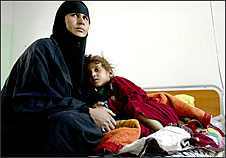 Among the many deprivations Iraq
has experienced, none is so closely correlated with
deaths as its damaged water system. Prior to 1990, 95
percent of urban households in Iraq had access to potable
water, as did three quarters of rural households. Soon
after the Persian Gulf War, there were widespread
outbreaks of cholera and typhoid diseases that had
been largely eradicated in Iraq as well as massive
increases in child and infant dysentery, and skyrocketing
child and infant mortality rates. By 1996 all
sewage-treatment plants had broken down. As the state's
economy collapsed, salaries to state employees stopped,
or were paid in Iraqi currency rendered nearly worthless
by inflation. Between 1990 and 1996 more than half of the
employees involved in water and sanitation left their
jobs. Among the many deprivations Iraq
has experienced, none is so closely correlated with
deaths as its damaged water system. Prior to 1990, 95
percent of urban households in Iraq had access to potable
water, as did three quarters of rural households. Soon
after the Persian Gulf War, there were widespread
outbreaks of cholera and typhoid diseases that had
been largely eradicated in Iraq as well as massive
increases in child and infant dysentery, and skyrocketing
child and infant mortality rates. By 1996 all
sewage-treatment plants had broken down. As the state's
economy collapsed, salaries to state employees stopped,
or were paid in Iraqi currency rendered nearly worthless
by inflation. Between 1990 and 1996 more than half of the
employees involved in water and sanitation left their
jobs.
The United States anticipated the collapse of the Iraqi
water system early on. In January 1991, shortly before
the Persian Gulf War began and six months into the
sanctions, the Pentagon's Defense Intelligence Agency
projected that, under the embargo, Iraq's ability to
provide clean drinking water would collapse within six
months. Chemicals for water treatment, the agency noted,
"are depleted or nearing depletion," chlorine
supplies were "critically low," the main
chlorine-production plants had been shut down, and
industries such as pharmaceuticals and food processing
were already becoming incapacitated. "Unless the
water is purified with chlorine," the agency
concluded, "epidemics of such diseases as cholera,
hepatitis, and typhoid could occur." All of
this indeed came to pass.
MEDICAL EQUIPMENT
As of last March, there were $25 million worth of holds
on contracts for hospital essentials sterilizers, oxygen
plants, spare parts for basic utilities that,
despite release by UNMOVIC, were still blocked by the
United States on the claim of "dual use."
As of September 2001, nearly a billion dollars'
worth of medical-equipment contracts for which all
the information sought had been provided was still
on hold.
In the late 1980s the mortality rate for Iraqi
children under five years old was about fifty per
thousand. By 1994 it had nearly doubled, to just under
ninety. By 1999 it had increased again, this time to
nearly 130; that is, 13 percent of all Iraqi children
were dead before their fifth birthday. For the most part,
they die as a direct or indirect result of contaminated
water.
It is no accident that the operation of the 661
Committee is so obscured. Behind closed doors, ensconced
in a U.N. bureaucracy few citizens could bypass.
American policymakers are in a good position to avoid
criticism of their practices; but they are also, rightly,
fearful of public scrutiny, as a fracas over a block on
medical supplies last year illustrates.
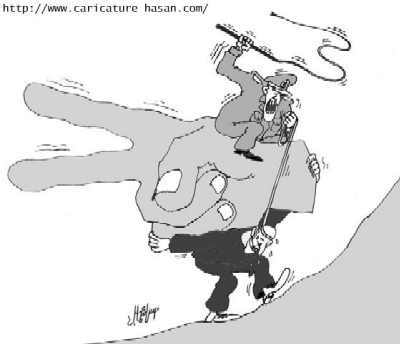
In early 2001, the United States had placed holds
on $280 million in medical supplies, including vaccines
to treat infant hepatitis, tetanus, and diphtheria, as
well as incubators and cardiac equipment. The rationale
was that the vaccines contained live cultures, albeit
highly weakened ones. The Iraqi government, it was
argued, could conceivably extract these, and eventually
grow a virulent fatal strain, then develop a missile or
other delivery system that could effectively disseminate
it. UNICEF and U.N. health agencies, along with other
Security Council members, objected
strenuously. Despite pressure behind the scenes from the
U.N. and from members of the Security Council, the United
States refused to budge. But in March 2001, when the
Washington Post and Reuters reported on the holds
and their impact the United States abruptly
announced it was lifting them.
"smart
sanctions,"
The idea behind smart sanctions is to "contour"
sanctions so that they affect the military and the
political leadership instead of the citizenry. Subsequently
basic civilian necessities, the State Department claimed,
would be handled by the U.N. Secretariat, bypassing the
Security Council. Critics pointed out that in fact
the proposal would change very little since everything
related to infrastructure was routinely classified as
dual use, and so would be subject again to the same kinds
of interference. What the "smart sanctions"
would accomplish was to mask the U.S. role. After the
embarrassing media coverage of the child-vaccine debacle,
the State Department was eager to see the new system in
place, and to see that none of the other permanent
members of the Security Council Russia, Britain,
China, and France vetoed the proposal.
In the end, China and France agreed to support the
U.S. proposal. But Russia did not, and immediately after
Russia vetoed it, the United States placed holds on
nearly every contract that Iraq had with Russian
companies.
GOODS REVIEW LIST
Then last November, the United States began lobbying
again for a smart-sanctions proposal, now called the
Goods Review List (GRL). The proposal passed the Security
Council in May 2002, this time with Russia's support.
In what one diplomat, anonymously quoted in the Financial
Times of April 3, 2002, called "the boldest move yet
by the U.S. to use the holds to buy political
agreement," the Goods Review List had the effect of
lifting $740 million of U.S. holds on Russian contracts
with Iraq, even though the State Department had earlier
insisted that those same holds were necessary to prevent
any military imports. Under the new system, UNMOVIC
and the
International Atomic Energy Agency make the initial
determination about whether an item appears on the GRL,
which includes only those materials questionable enough
to be passed on to the Security Council. The list is
precise and public, but huge. Cobbled together from
existing U.N. and other international lists and
precedents, the GRL has been virtually customized to
accommodate the imaginative breadth of U.S. policymakers'
security concerns.
Propaganda ?
When U.N. weapons experts began reviewing the $5 billion
worth of existing holds last July, they found that very
few of them were for goods that ended up on the GRL or
warranted the security concern that the United States had
originally claimed. As a result, hundreds of holds have
been lifted in the last few months.
In December 2000, the Security Council passed a
resolution allowing Iraq to spend 600 million
euros (about $600 million) from its oil sales on
maintenance of its oil-production capabilities. The
United States and Britain devised a system that had the
effect of undermining Iraq's basic capacity to sell oil:
"retroactive pricing." Taking advantage of the
fact that the 661 Committee sets the price Iraq receives
from each oil buyer, the United States and Britain began
to systematically withhold their votes on each price
until the relevant buying period had passed. The idea
was that then the alleged surcharge could be subtracted
from the price after the sale had occurred, and that
price would then be imposed on the buyer. The effect of
this practice has been to torpedo the entire Oil for Food
Programme. Obviously, few buyers would want to commit
themselves to a purchase whose price they do not know
until after they agree to it. As a result of this system,
Iraq's oil income has dropped 40 percent since last year,
and more than $2 billion in humanitarian contracts
all of them fully approved are now stalled.
*********************************************************************
Can we now depend on
the 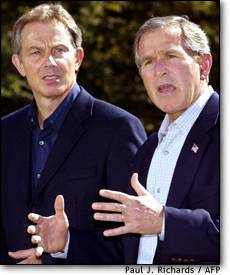 united nations to come to an equable
and just decision about the usa's desired war on iraq
when they have allowed the usa and britain, by a
technical rule, incapacitate and destroy that nation ?? united nations to come to an equable
and just decision about the usa's desired war on iraq
when they have allowed the usa and britain, by a
technical rule, incapacitate and destroy that nation ??
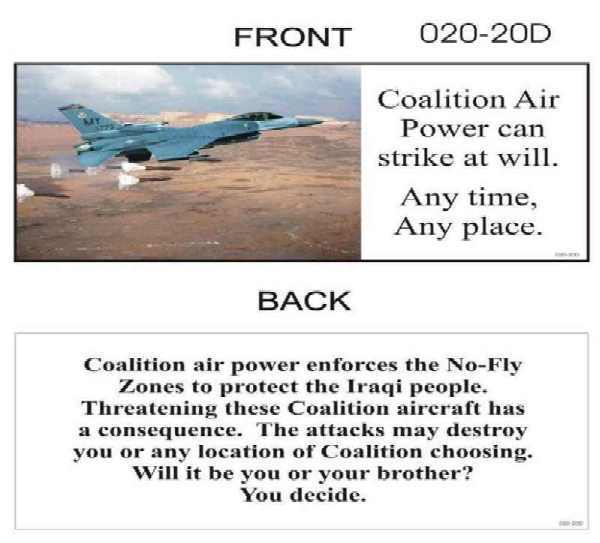
Iraq
Population:
21,422,292 Density:128 per Sq.
Mi Area: 167,975 Sq. Mi (438,317 sq.
km)
Ethnic Groups:
Arab 80% and Kurds 15%, Others 5%
Languages:
Arabic (official), Kurdish, Assyrian, Chaldian, Armenian
Religions:
Muslims 97% (Shi'a 60%, Sunni 37%), Christians 3%
Government
Type: Republic.
Head
of State: President Saddam Hussein
Local
Divisions: 18 Provinces
|

 Weapon of Mass Destruction
Weapon of Mass Destruction
 Many members
of the Security Council have been sharply critical of
these practices. In an April 20, 2000, meeting of the
661 Committee, one member after another challenged the
legitimacy of the U.S. decisions to impede the
humanitarian contracts. The problem had reached "a
critical point," said the Russian delegate; the
number of holds was "excessive," said the
Canadian representative; the Tunisian delegate expressed
concern over the scale of the holds. The British and
American delegates justified their position on the
grounds that the items on hold were "dual use"
goods that should be monitored, and that they could not
approve them without getting detailed technical
information. The French delegate suggested, that
providing prompt, detailed technical information was not
sufficient to get holds released: a French contract for
the supply of ventilators for intensive care units
had been on hold for more than five months, despite his
government's prompt and detailed response to a request
for additional technical information and the obvious
humanitarian character of the goods.
Many members
of the Security Council have been sharply critical of
these practices. In an April 20, 2000, meeting of the
661 Committee, one member after another challenged the
legitimacy of the U.S. decisions to impede the
humanitarian contracts. The problem had reached "a
critical point," said the Russian delegate; the
number of holds was "excessive," said the
Canadian representative; the Tunisian delegate expressed
concern over the scale of the holds. The British and
American delegates justified their position on the
grounds that the items on hold were "dual use"
goods that should be monitored, and that they could not
approve them without getting detailed technical
information. The French delegate suggested, that
providing prompt, detailed technical information was not
sufficient to get holds released: a French contract for
the supply of ventilators for intensive care units
had been on hold for more than five months, despite his
government's prompt and detailed response to a request
for additional technical information and the obvious
humanitarian character of the goods. Among the many deprivations Iraq
has experienced, none is so closely correlated with
deaths as its damaged water system. Prior to 1990, 95
percent of urban households in Iraq had access to potable
water, as did three quarters of rural households. Soon
after the Persian Gulf War, there were widespread
outbreaks of cholera and typhoid diseases that had
been largely eradicated in Iraq as well as massive
increases in child and infant dysentery, and skyrocketing
child and infant mortality rates. By 1996 all
sewage-treatment plants had broken down. As the state's
economy collapsed, salaries to state employees stopped,
or were paid in Iraqi currency rendered nearly worthless
by inflation. Between 1990 and 1996 more than half of the
employees involved in water and sanitation left their
jobs.
Among the many deprivations Iraq
has experienced, none is so closely correlated with
deaths as its damaged water system. Prior to 1990, 95
percent of urban households in Iraq had access to potable
water, as did three quarters of rural households. Soon
after the Persian Gulf War, there were widespread
outbreaks of cholera and typhoid diseases that had
been largely eradicated in Iraq as well as massive
increases in child and infant dysentery, and skyrocketing
child and infant mortality rates. By 1996 all
sewage-treatment plants had broken down. As the state's
economy collapsed, salaries to state employees stopped,
or were paid in Iraqi currency rendered nearly worthless
by inflation. Between 1990 and 1996 more than half of the
employees involved in water and sanitation left their
jobs.
 united nations to come to an equable
and just decision about the usa's desired war on iraq
when they have allowed the usa and britain, by a
technical rule, incapacitate and destroy that nation ??
united nations to come to an equable
and just decision about the usa's desired war on iraq
when they have allowed the usa and britain, by a
technical rule, incapacitate and destroy that nation ??